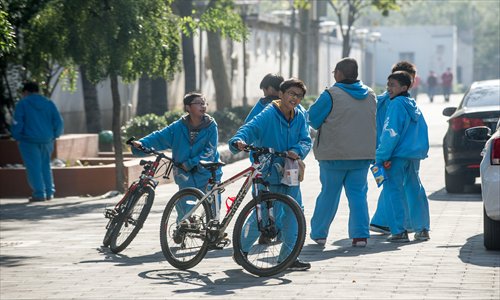Exams risk to high school kids’ health

Nearly 90 percent of the capital's high school students have some kind of health problem, according to Beijing health authorities, which have blamed intensive study for examinations on the continuous decline in the health of high school students in recent years.
The lack of public attention to this issue has caused it to become an ongoing problem, the Beijing Physical Examination Center told the Global Times Tuesday.
The center, which comes under Beijing Health Bureau, released the Beijing Physical Examination Statistics Report for 2011 on Monday.
The study focused on the increase in the numbers of people affected by nearsightedness, blood pressure problems, and obesity, which all witnessed a rise to some extent.
Obesity is becoming a pressing problem in the teen population, the report said.
The report said that only 13 percent of high school graduates were in perfect health, a figure that has not changed much in recent years. The center examined over 80,000 high school graduates in 2011 for the report.
Sun Liguang, the director of Beijing Physical Examination Center in Xicheng district, told the Global Times that the center has conducted annual investigations since 2003, but this is the first time it has released the results to the public.
According to the report, in 2011, only 13.39 percent of students were in absolute good health and 86.59 percent just passed the basic health condition standard. Sun said that in order to be one of the 13.39 percent, several standards must be met, one of which was having good eyesight.
"Take nearsightedness for instance, the number of students with nearsightedness was 83.69 percent in 2010, which increased to 86.15 percent in 2011," he said.
"The heavy burden of studying for the gaokao [college entrance examinations] is the fundamental cause of the decline in students' health. I think that either parents or schools pay more attention to exam grades than student health," said Sun.
In terms of obesity, 5,992 or 9.54 percent of male students and 2,799 female students, or 7.09 percent were facing this problem, the Beijing Times said Tuesday, quoting the report. Blood pressure problems were increasing, but overall, the number of students with this problem is relatively low, fewer than one percent.
Nineteen-year-old Zhao Lin, who wears glasses to correct nearsightedness, said she remembers how stressful it was before she sat the gaokao in 2011, and said she often suffered from illness at the time.
"In fact, the study burden lasted through the final three years of high school. Me and my classmates spent almost all of our time in the classroom," she said.
"There was little time for physical exercise or even sleep. My parents wanted me to take some rest, but the pressure of the exams didn't allow me to," said Zhao.
Li Yanhua, a 40-year-old mother whose son is in high school, said that she does worry about her son's health, but feels there is little she can do about it, as all the other students are forced to study in the same way.
"I'm equally concerned about his gaokao performance, which will determine his life as well," she said.
"Since all his classmates study under pressure, then we should do the same so he doesn't lag behind," said Li.
Chu Zhaohui, a researcher with the China National Institute for Education Research, told the Global Times that the students' bad health is a direct reflection of the pressure from the exams.
"The only solution to the problem is not to allow one single exam to define a student," he said.
"Instead, if students could be judged by various aspects, including the time they participated in social activities or expanding on a hobby they love, they might be in a better health condition as a result," said Chu.
Chu said that he understands that some Chinese people send their children to study overseas at very early age just to escape the gaokao.
"They do this partly because of their children's health," he noted.